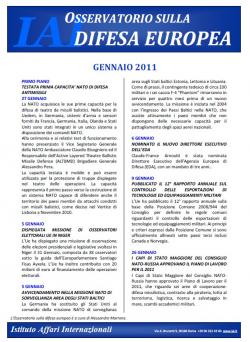Observatory on European defence, December 2005

15-16 December 2005
European Council - ESDP Missions
The European Council approved the six-monthly Report on ESDP and called upon the Austrian Presidency (first semester 2006) to continue to develop the EU's military and civilian capabilities.
Four papers submitted by the High Representative Solana recommend lines of intervention concerning cooperation in the armaments field, development of an integrated framework for operational command structures and increases in the ESDP budget.
On 15 December the European Parliament approved a CFSP budget for 2006 amounting to about 102.6 million euros (62.6 in 2005).
The Austrian Presidency is charged with managing the numerous EU missions under way and launching an EU police mission in Kosovo.
Following expiry of the mandate of the EUPOL PROXIMA mission in Macedonia-FYROM, a EU Police Advisory Team (EUPAT) is operational (from 15 December until 14 June 2006). Moreover the European Council granted Macedonia-FYROM EU candidate country status. The mandate of the military mission in Bosnia-Herzegovina (EUFOR/ALTHEA) will remain unchanged during the next six months, and will commanded by Italian General Chiarini from 6 December.
The European Council confirmed its commitment to the reconstruction of Iraq and political transition in the country, to which end it is present with the integrated Rule of Law mission (EUJUST LEX).
16 December 2005
European Defence Agency - Capabilities, European Defence Market
The Steering Board of the European Defence Agency (EDA), meeting at National Research Directors level, identified some priorities for defence R&D cooperation for 2006.
These include robotics, information fusion, fuel cells and unmanned land, sea and air vehicles.
Previously, on 14 December, the EDA awarded the first feasibility study financed by its budget, on a Long Endurance Unmanned Aerial Vehicle (LE UAV), equipped with Digital Line of Sight and Beyond Line of Sight (LOS/BLOS) technologies.
The EDA welcomed the Communication of the European Commission of 6 December on the European defence market, fallowing the consultations launched by the Green Paper on Defence Procurement published in September 2004. In November, the EDA adopted a voluntary Code of Conduct, not legally binding, aimed at opening the European military acquisitions market to competition, a market normally exempted from the common market rules by the exception provided in art.296 ECT. It will take effect from 1 July 2006, after the adhesion of the member States. The Commission confirmed its intention to adopt in 2006 an interpretative Communication on the applicability of the exception more consistent with the Case Law of the European Court of Justice. At the same time the Commission will work on a proposal for a Directive that, studying the specificities of the sector and regulates the contracts for which the exception of art. 296 ECT could apply but which do not have the strategic nature required to make exemption from the common market rules worthwhile. Therefore the Code of Conduct, the interpretative Communication and the Directive are complementary initiatives.
December 2005
EU - International Terrorism, Afghanistan
During the month the EU launched several initiatives aimed at countering international terrorism. The Justice and Home Affairs (JHA) Council of 1 December discussed the six-monthly implementation of the Action Plan to combat terrorism, at single member States' level and in particular regarding aspects related to financing, judicial cooperation, information exchange, and European coordination in case of crisis.
The Council agreed on several documents subsequently adopted by the European Council of 15-16 December, among which a new EU strategy for terrorism - focused on prevention, protection, pursuit (respecting legality and human rights) and response - and a strategy for combating radicalisation and recruitment. Moreover the JHA Council endorsed a Report submitted by the Presidency and the EU Counter-Terrorism Coordinator de Vries on an EU mechanism for coordination in managing cross-border crises and emergencies involving terrorism but also natural disasters, industrial accidents, and pandemics, to be implemented by 1 July 2006.
On 1 December the European Commission published a Communication on practices for fighting the financing of terrorism, while the Ecofin Council of 6 December defined the general lines of a draft Regulation ensuring the identification of operators.
The JHA Council also dealt with telecommunications data retention, reaching an agreement on a proposal for a Directive subsequently approved in first reading by the European Parliament on 14 December. The length of retention will be from 6 months to 2 years and access will be allowed only to competent authorities designated by member States.
The General Affairs and External Relations Council of 12 December confirmed the civilian and military support of the EU member States to Afghanistan. Previously the JHA Council of 1 December allocated a further 250 million euros for combating drugs in the country.
On 8 December the North Atlantic Council (NAC) formally approved the OPLAN for the third phase of expansion of the NATO ISAF mission to southern Afghanistan; at the end of the force generation process, an activation order, foreseen for spring 2006, will increase troops from the current 9,000 to about 15,000 men. Concerning the US-led mission Enduring Freedom, on 19 December US Secretary of Defence Rumsfeld signed an order to decrease US troops by about 3,000 soldiers, bringing their number down to about 15,000 units.
December 2005
EU-ESA - Space Policy, Galileo
The European Council of 15-16 December called upon the Austrian Presidency to continue progress in the EU space policy.
On 6 December the 2006 annual budget for the European Space Agency (ESA) was approved (about 3 billion euros).
The main programme under way is the Galileo satellite navigation system: on 5 December an agreement was reached to establish the sites of its terrestrial infrastructure in France, Germany, Spain, Italy and the United Kingdom.
On 28 December Giove-A, the system's first experimental satellite, was put into orbit.
-
Details
Roma, Istituto affari internazionali, 2005 -
Issue
05/12


